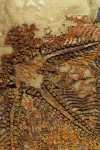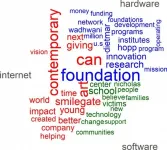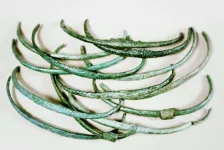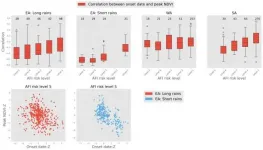Internet and freedom of speech, when metaphors give too much power
Since 1997, when the US supreme court metaphorically called the Internet the free market of ideas, attempts at regulation have been blocked by the 1st amendment. But with power concentrated in a few platforms, that metaphor is now misleading, says a study
2021-01-21
(Press-News.org) Since 1997 (Reno vs. American Civil Liberties Union), the Supreme Court has used the metaphor of the free market of ideas to define the Internet, thus addressing the regulation of the net as a matter of freedom of speech. In law, metaphors have a constitutive value and, once established, affect the debate and the decisions of the Courts for a long time. In the paper 'Judicial Frames and Fundamental Right in Cyberspace', published in the American Journal of Comparative Law, Oreste Pollicino (Bocconi University) and Alessandro Morelli (Università Magna Graecia, Catanzaro) apply to judicial reasoning reflections on metaphors and go so far as to criticize, on the one hand, the US Supreme Court's orientations on (non-)regulation of the Internet and, on the other, to invoke changes in Directive 2000/31/EC on e-commerce. Internet regulation should be framed not as a matter of freedom of speech, but as a matter of freedom to conduct a business, they argue.
The metaphor was used for the first time in 1919 in a dissenting opinion of Judge Oliver Wendell Holmes on a Supreme Court decision concerning the expression of anti-war ideas and implies the fact that, when there is competition in a free market of ideas, even the worst of them (and therefore also the false ones) should be admitted, in the certainty that the best ones (and ultimately the truth) would still prevail.
«Since 1997», explains Professor Pollicino, «every decision on the possible regulation of the Internet in the US has referred to the First Amendment, which guarantees freedom of speech and is in fact superordinate to any other freedom»., The jurisprudential line followed by the Supreme Court for more than 30 years, then, derives from the use of a metaphor.
«Since then, however», continues Prof. Pollicino, «the context has completely changed and the metaphor is now misleading». In fact, the large Internet platforms have assumed such a power as to counterbalance, in many fields, the power of Governments, without being conditioned by any geographical border.
The large platforms can no longer be considered actors like the others, competing on equal terms in a free market of ideas, and the American legal tradition, which enforces the freedom of speech only vertically (when the freedom of a private individual is limited by a public power) should instead enforce it also horizontally, when one of the private actors holds an overwhelming power. Still in 2017, however, in the Packingham vs. North Carolina decision, social networks were defined as «the new free market of ideas», leaving little room for hope that such a market can be regulated in some way (even if only imposing serious obligations to remove fraudulent or dangerous material, as happens for example in Germany).
In Europe, the situation is more fluid, because the judicial tradition foresees a certain balance between the different rights, but the pressures to adopt a vision close to the American one are still strong. «The Directive 31 of 2000, at the dawn of social networks, equated them to the service or hosting providers of those years, thus substantially denying any responsibility for the posted content. Some recent EU legislation (or proposals) on anti-terrorism protection, audiovisual discipline and copyright are eroding the directive, but aren't directly calling it into question. Perhaps the time has come to do so» argues Pollicino.
The right way forward, according to the authors, could be to frame Internet regulation not as a matter of freedom of speech, but as a matter of freedom to conduct a business. «What platforms really want to avoid is to change their business model: content monitoring is expensive and could discourage some from using the platforms. But the freedom to conduct a business, however protected, is not superordinate to other rights in any system and should therefore be counterbalanced by the rights to privacy, security, reputation and protection of minors». The contest for ideas is therefore open and the rhetoric of the absolutization of fundamental rights is often counterproductive. What metaphor would make it possible to address the issue in this way? «Certainly, importing into Europe the US metaphor of the free marketplace of ideas, decontextualized it from the constitutional paradigms that frame it (Freedom in the USA and Dignity in Europe) can be very risky», concludes Prof. Pollicino.
INFORMATION:
[Attachments] See images for this press release:

ELSE PRESS RELEASES FROM THIS DATE:
2021-01-21
In the first systematic large-scale evaluation of the UK National Early Warning Risk Score (NEWS) 2 as a scoring system for predicting severe COVID-19 outcomes in patients, researchers at King's College London have found poor-to-moderate accuracy for identifying patients at risk of being transferred to intensive care units (ICUs) or dying after 14 days of hospitalisation. Accuracy of predictions in short term (three days) showed moderate success.
For people who are hospitalised with severe COVID-19, it is vital to quickly identify which patients may deteriorate and require transfer to an intensive care unit (ICU) for organ support or may die. NEWS2 is an ...
2021-01-21
Researchers from the University of Cambridge have discovered a fossil of the earliest starfish-like animal, which helps us understand the origins of the nimble-armed creature.
The prototype starfish, which has features in common with both sea lilies and modern-day starfish, is a missing link for scientists trying to piece together its early evolutionary history.
The exceptionally preserved fossil, named Cantabrigiaster fezouataensis, was discovered in Morroco's Anti-Atlas mountain range. Its intricate design - with feathery arms akin to a lacework - has been frozen in time for roughly 480 million years.
The new species is unusual because it doesn't have many of the key features of its contemporary relatives, lacking roughly 60% of ...
2021-01-21
Antidepressants are commonly used worldwide to treat pain, however new research from the University of Sydney shows they offer little to no help for people suffering chronic back pain and osteoarthritis and may even cause harm.
Back pain and knee osteoarthritis affect millions of people globally and are leading causes of disability. When first-line pain medications such as paracetamol and ibuprofen fail to improve symptoms, many people are prescribed antidepressants for their pain. Most clinical practice guidelines recommend antidepressants for long term (chronic) back pain and hip and knee osteoarthritis, yet evidence supporting their use is uncertain.
Published today in the BMJ the ...
2021-01-21
Antidepressant drugs are largely ineffective for back and osteoarthritis pain, despite being widely used for these conditions, suggests a review of the evidence published by The BMJ today.
The findings, based on moderate certainty evidence, show that for people with back pain the effects were too small to be worthwhile, but for osteoarthritis a small beneficial effect cannot be ruled out.
Most clinical practice guidelines recommend antidepressants for long term (chronic) back pain and hip and knee osteoarthritis, yet evidence supporting their use is uncertain.
To address this knowledge gap, researchers led by Giovanni Ferreira at the ...
2021-01-21
Adding the arthritis drug tocilizumab to standard care for patients in hospital with severe or critical covid-19 is no better than standard care alone in improving clinical outcomes at 15 days, finds a new trial published by The BMJ today.
There was an increased number of deaths at 15 days in patients receiving tocilizumab, resulting in the trial being stopped early.
Today's results contradict earlier observational studies suggesting a benefit of tocilizumab. However, observational effects are limited by a high risk that they may be due to other unknown (confounding) factors - and some studies have not yet been peer ...
2021-01-20
MINNEAPOLIS - A new study has found a brain pressure disorder called idiopathic intracranial hypertension is on the rise, and the increase corresponds with rising obesity rates. The study is published in the January 20, 2021, online issue of Neurology®, the medical journal of the American Academy of Neurology. The study also found that for women, socioeconomic factors like income, education and housing may play a role in their risk.
Idiopathic intracranial hypertension is when the pressure in the fluid surrounding the brain rises. It can mimic the symptoms of a ...
2021-01-20
MINNEAPOLIS - A new study shows that intense immunosuppression followed by a hematopoietic stem cell transplant may prevent disability associated with multiple sclerosis (MS) from getting worse in 71% of people with relapsing-remitting MS for up to 10 years after the treatment. The research is published in the January 20, 2021, online issue of Neurology®, the medical journal of the American Academy of Neurology. The study also found that in some people their disability improved over 10 years after treatment. Additionally, more than half of the people with the secondary progressive form of MS experienced no worsening of their symptoms 10 years after a transplant.
While most people with MS are first diagnosed with relapsing-remitting MS, marked by symptom ...
2021-01-20
The new tech elite share distinct views setting them apart from other segments of the world's elite more generally, according to a study published January 20, 2020 in the open-access journal PLOS ONE by Hilke Brockmann from Jacobs University Bremen, Germany, and colleagues.
The global economic landscape over the last half-century is marked by a shift to a high-tech economy, dominated by the "Big Nine" (Amazon, Apple, Facebook, Google, IBM, Microsoft, Alibaba, Baidu, Huawei, and Tencent), computer hardware and software manufacturers, and most recently, app companies. In this study, Brockmann and colleagues investigate the worldviews of the 100 richest people in the tech world (as defined by Forbes).
Though the authors initially approached all 100 of their subjects for a face-to-face ...
2021-01-20
In the Early Bronze Age of Europe, ancient people used bronze objects as an early form of money, even going so far as to standardize the shape and weight of their currency, according to a study published January 20, 2020 in the open-access journal PLOS ONE by Maikel H. G. Kuijpers and C?t?lin N. Popa of Leiden University, Netherlands.
Money is an important feature of modern human society. One key feature of money is standardization, but this can be difficult to identify in the archaeological record since ancient people had inexact forms of measurement compared with today. In this study, the authors assessed possible money from the Early Bronze Age of Central Europe, comparing the objects based on their perceived - if not ...
2021-01-20
The onset date of the yearly rainy season reliably predicts if seasonal drought will occur in parts of Sub-Saharan Africa that are particularly vulnerable to food insecurity, and could help to mitigate its effects. Shraddhanand Shukla and colleagues at the University of California, Santa Barbara's Climate Hazards Center, present these findings in the open-access journal PLOS ONE on January 20, 2021.
Climate-driven seasonal drought can impact crop yields and is among major contributors to food insecurity, which can threaten people's lives and livelihoods. In the last ...
LAST 30 PRESS RELEASES:
[Press-News.org] Internet and freedom of speech, when metaphors give too much power
Since 1997, when the US supreme court metaphorically called the Internet the free market of ideas, attempts at regulation have been blocked by the 1st amendment. But with power concentrated in a few platforms, that metaphor is now misleading, says a study




